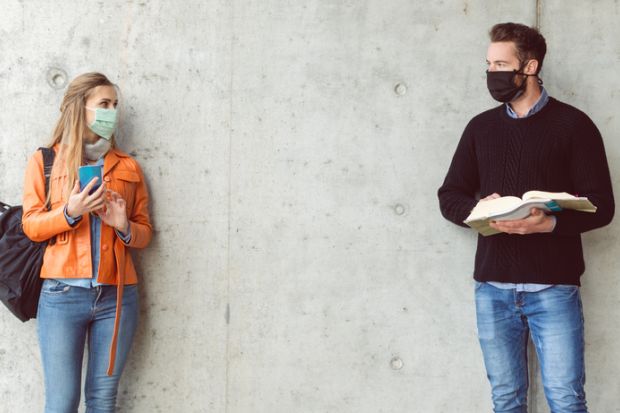English universities should agree with local public health teams how much in-person teaching should be done during the national lockdown, and masks must be warn in all learning environments, according to latest government advice.
The Department for Education has issued guidance ahead of the new national restrictions that come into force on 5 November.
According to the document, the appropriate balance of online and in-person teaching should be based on an overall assessment of the public health risks, which must include the mental health of students and the status of local outbreaks.
“We would expect face-to-face teaching to continue under the new restrictions where providers are able to do so in a Covid-secure way,” the guidance says.
This will include wearing face coverings in all learning environments, as long as it does not impact teaching and learning.
The guidance says campus libraries and study spaces should remain open to students and staff while maintaining Covid-secure measures.
Many institutions in areas with high numbers of cases – such as Newcastle, Manchester and Sheffield – have already moved the majority of their courses online.
In early October, the University of Manchester announced that in-person teaching would take place “only where it is essential and in line with the necessary health and safety precautions” for three weeks after a rise in the number of cases among students. In its latest statement, the university has said that in light of the national restrictions, it will continue to provide teaching and learning in this way.
Sheffield Hallam University, which also temporarily increased its online learning in October, has said that, because of the tighter lockdown restrictions, “timetabled ‘live’ online sessions will provide structured teaching throughout the week” where online on-campus teaching is not required.
The University and College Union, the UK’s biggest higher education union, has continued to call for universities to switch their teaching online in light of the pandemic.
On 3 November, the UCU’s general secretary, Jo Grady, said: “Following updated guidance from the Westminster government, we are calling on vice-chancellors in England to exercise their autonomy and move all non-essential activities online now.
“Universities must not risk the health and safety of staff and students by allowing non-essential in-person activities to continue. Reducing the amount of in-person teaching and travel to and from campus will minimise the spread of Covid-19 and keep people as safe as possible.”
The DfE’s guidance also warns that if a provider decides that it will increase its online learning, “they must continue to comply with registration conditions relating to quality and standards”.
“We expect providers to ensure that they can continue to deliver courses which are fit for purpose and help students progress their qualifications,” the document says.
The DfE says students who wish to make complaints about their experience should lodge them with the Office of the Independent Adjudicator.
“Whether or not an individual student is entitled to a refund of fees will depend on the specific contractual arrangements between the provider and student,” the DfE says.
The government has advised students that they must stay in their halls of residence and not return home during the national lockdown. Students who commute to university should continue to do so, the DfE says.
The DfE said it would “publish further guidance shortly on how students can return home safely at the end of term”.
The department also said it had written to universities asking them to “ensure that self-isolating students have a range of choices available for access to food and other essential supplies”.
Julia Buckingham, president of Universities UK, said the guidance “provides much-needed clarity for university staff and students”.
“Students and young people suffered enormously from reduced social contact and disruption during the first national lockdown, so it is even more important that they can get on with their education during the period of enhanced restrictions starting this week,” Professor Buckingham said.
“We welcome both the government’s confirmation that it does not want or expect a transition to full online learning, as well as their support for the blended approach being taken by the sector.
“Universities will continue offering some face-to-face learning and support where it is possible to do so in a safe, physically distanced way, which we believe is important for the mental, emotional and educational well-being of students.”
Register to continue
Why register?
- Registration is free and only takes a moment
- Once registered, you can read 3 articles a month
- Sign up for our newsletter
Subscribe
Or subscribe for unlimited access to:
- Unlimited access to news, views, insights & reviews
- Digital editions
- Digital access to THE’s university and college rankings analysis
Already registered or a current subscriber? Login




